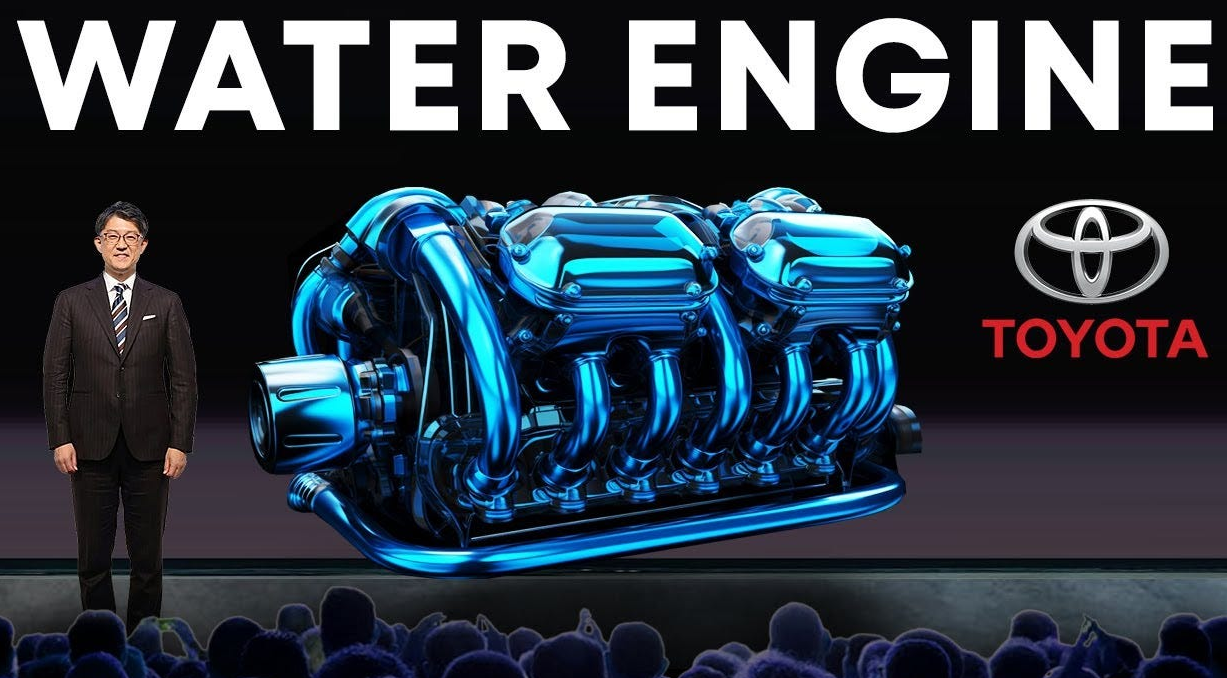In recent years, electric vehicles (EVs) have taken the automotive world by storm, with a focus on reducing carbon emissions and offering cleaner alternatives to gasoline-powered cars. However, Toyota has recently introduced a groundbreaking development that could potentially change the future of transportation entirely: Toyota’s new water engine. This revolutionary technology might disrupt the entire electric vehicle industry, and it has been sparking intense debates within the automotive and energy sectors.
But what exactly is this water engine, and how could it challenge the dominance of electric vehicles?
Let’s take a closer look at Toyota’s water engine, its technology, and its potential impact on the future of the automotive industry.
What Is Toyota’s Water Engine?

Toyota’s water engine is a concept that uses water as a fuel source, utilizing a process known as hydrogen combustion. Unlike electric vehicles, which depend on lithium-ion batteries that need to be charged from the grid, the water engine runs on hydrogen, which can be extracted from water through a process called electrolysis.
The technology is based on the fact that hydrogen is one of the most abundant elements on Earth, and water is a natural source of hydrogen. The idea is to extract hydrogen from water and burn it in a combustion engine, which produces power while emitting only water vapor as a byproduct. This makes it a cleaner alternative to traditional fossil fuels and even electric cars.
How Does Toyota’s Water Engine Work?

The process involves using electrolysis to separate water (H₂O) into its two core components: hydrogen (H₂) and oxygen (O₂). The hydrogen is then used as a fuel source in a combustion engine, similar to how gasoline or diesel fuel is used in conventional cars. The oxygen is released back into the atmosphere, and the result is clean, zero-emission power that doesn’t require a heavy battery pack like an EV.
Electrolysis: This is the first step, where electricity is used to split water into hydrogen and oxygen. If the electricity comes from renewable sources like solar or wind, this process becomes fully sustainable.
Combustion Engine: The extracted hydrogen is then used to power the combustion engine, similar to how gasoline powers traditional internal combustion engines.
Emission-Free: The only byproduct of burning hydrogen is water vapor, making this process incredibly eco-friendly.
How Could This Technology Impact the EV Industry?
Reduced Dependency on Lithium-Ion Batteries
Electric vehicles rely heavily on lithium-ion batteries, which not only require significant mining of lithium but also have an environmental impact due to the production, disposal, and recycling of these batteries. Moreover, battery production requires rare earth minerals, which are often in limited supply.
Toyota’s water engine eliminates the need for these batteries, offering a potentially endless and eco-friendly fuel source that is easier to produce and more sustainable in the long term. This could make water-based hydrogen engines a strong contender to replace the need for EV batteries entirely.
Faster Refueling Times
One of the most significant drawbacks of electric vehicles is the long refueling times associated with recharging. Charging an electric car can take several hours, even with fast chargers. In contrast, hydrogen combustion engines can be refueled within minutes, similar to the process of refueling a conventional gasoline vehicle. This is a major advantage in terms of convenience and practicality.
Global Hydrogen Infrastructure Development
Currently, the hydrogen infrastructure is not as widespread as the charging network for electric vehicles. However, Toyota’s push for water engines could accelerate the global adoption of hydrogen refueling stations. Countries around the world may begin investing in hydrogen infrastructure, which would support a significant shift away from EVs that rely on charging stations. This would encourage more consumers to switch to hydrogen-powered vehicles.
Cost-Effectiveness and Sustainability
While the initial cost of developing hydrogen engines and setting up the necessary infrastructure may be high, in the long term, water engines could prove more cost-effective. Water is abundant, and hydrogen can be produced locally using renewable energy, reducing reliance on oil or electricity from the grid. This decentralized and sustainable model could appeal to governments and consumers alike, especially if fuel prices are lower compared to electricity or gasoline.
Will Toyota’s Water Engine Completely Replace EVs?
While the technology is promising, it’s important to consider that the water engine is still in its early stages of development. There are many challenges to overcome, including scaling the hydrogen production process and building the necessary infrastructure for refueling stations. Additionally, hydrogen combustion engines are not the only alternative to EVs; other technologies, such as hydrogen fuel cells and synthetic fuels, are also in development.
Moreover, the electric vehicle industry is already undergoing significant growth, with advances in battery technology that could improve charging speeds, energy density, and overall efficiency. EVs are also benefiting from the global push for renewable energy and government incentives, which makes it unlikely that the water engine will completely replace electric vehicles in the immediate future.
However, the introduction of Toyota’s water engine could shift the balance, particularly if the technology proves to be more scalable, cost-effective, and sustainable in the long run. Toyota has the resources and expertise to make this a reality, and it could be a game-changer in terms of revolutionizing the way we think about transportation.
Popular Questions About Toyota’s Water Engine
What is Toyota’s water engine?
Toyota’s water engine uses hydrogen extracted from water to power a combustion engine, emitting only water vapor as a byproduct.
How does a water engine work?
The engine works by using electrolysis to separate water into hydrogen and oxygen, then burning the hydrogen in a combustion engine.
Will the water engine replace electric vehicles?
While it has the potential to disrupt the electric vehicle market, it is still in development, and EVs are likely to remain a key player for the foreseeable future.
What are the advantages of Toyota’s water engine over electric vehicles?
Water engines offer faster refueling times, eliminate the need for lithium-ion batteries, and use an abundant, sustainable fuel source—water.
Is the hydrogen used in the water engine environmentally friendly?
Yes, if hydrogen is produced using renewable energy sources (green hydrogen), the process is sustainable, with water vapor being the only emission.
How long until Toyota’s water engine is commercially available?
The technology is still in its early stages, and it could take several years before Toyota rolls out a commercially viable version of the water engine.
Can water engines help reduce the need for charging infrastructure?
Yes, hydrogen refueling stations could become widespread, reducing the reliance on electric vehicle charging stations and providing more convenience.
Conclusion
Toyota’s new water engine represents a bold step toward revolutionizing transportation. If successful, it could challenge the entire electric vehicle industry by offering a more sustainable, quicker, and cost-effective alternative to EVs. While the technology is still in its infancy, the potential is enormous, and Toyota’s move could force the automotive industry to rethink the future of eco-friendly vehicles.
For now, we can only wait and watch as this new technology develops—will it change the world of transportation for good?

